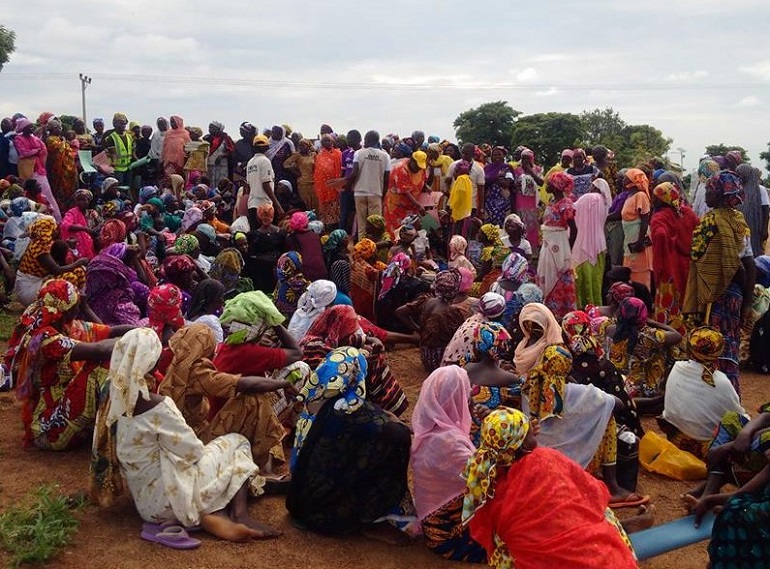
As Nigerians are preparing to go to the polls tomorrow to elect a new president, Boko Haram has been stepping up attacks in the northeast of the country, making it difficult if not impossible for people to vote.
On Tuesday, 12 February, the Islamist militants attacked Madagali town, Gulak, Magar and Shuwa in Madagali Local Government Area, Adamawa State, where they killed at least 4 residents and destroyed properties.
It was the third attack in nine days, sending residents fleeing for their lives, reports The Nation newspaper. According to reports, the military was able to drive the insurgents back and kill most of them.
“Christians say [Boko Haram] is trying to eliminate them from this area and that they have been forced to flee into the mountains,” a local source told World Watch Monitor. “These events will make it nearly impossible for [them] to vote this weekend.”
The Independent National Electoral Commission last month decided to limit the number of polling stations in the Madagali area to three because of security concerns.
‘Disappointed with this administration’
President Muhammadu Buhari, who is hoping for a second term after tomorrow’s elections, came to power in 2015 with the promise to silence Boko Haram. So far, he has failed to curb the Islamist insurgency, despite claims that the radical Islamic group has been technically defeated.
Boko Haram’s nine-year insurgency has been described by the United Nations as one of the most severe in the world today, with more than 20,000 people killed, more than 4,000 women and girls abducted, and more than 2 million internally displaced people.
“If truth must be told, many Christians are very disappointed with his administration when it comes to security for all and especially Christians in the Middlebelt, North East and North West. He tries to deny it but his appointments especially in the security apparatus are virtually filled with Muslims,” said Rev. Gideon Para-Mallam, a peace advocate in Jos, the capital of Plateau State.
“Christians desire security above all else,” he said. “Christians want to see Leah Sharibu, Alice Ngaddah and the Chibok girls along with several in captivity: Muslims and Christians alike, set free.”
In September last year, Boko Haram killed an aid worker and threatened to kill three other hostages, including the Christian schoolgirl Leah Sharibu. The 14-year-old was abducted with more than 100 other girls from their school in Dapchi, north-eastern Yobe state, almost exactly one year ago. While the other girls were released, the militants kept Leah because she refused converting to Islam. The abduction came almost four years after the militant group kidnapped 276 girls from a boarding school in Chibok.
Fulani violence
While Boko Haram is creating havoc in northeast of Nigeria, violence attributed to Fulani militants in Nigeria’s Middle Belt is believed to have claimed six times more lives than Boko Haram in recent years. The conflict between farmers and herders has become the country’s gravest security challenge.
In June, the violence reached another peak, as Fulani herdsman armed with sophisticated weapons went on a killing spree in 15 communities, leaving more than 230 dead. The attacks forced more than 11,500 to seek refuge in 13 locations across the state, while an undetermined number of people were injured and hospitalised in various medical centres in Jos.
In one of the last attacks in Plateau State, where raids have been taking place almost on a daily basis, Fulani militants attacked Alese village in Barkin Ladi Local Government Area, reports Stefanos Foundation. On Monday, 11 February, armed Fulani men entered the village where they “went on a rampage, shooting sporadically”. When villagers chased them out, they shot and hacked to death a 26-year-old man from Kwaghasalalek village.
In a protest that followed, demonstrators clashed with the convoy of governor Simon Lalong, who was campaigning in the area. Security forces fired on the crowd, killing three and injuring many more, the Stefanos Foundation said.
Meanwhile, Reuters reported an attack on the convoy of the governor of Nigeria’s northeastern state of Borno by suspected Boko Haram militants on Tuesday evening. At least three people were killed in the attack.
”We want to see a fair and equitable distribution of the wealth of this nation to all Nigerians, good governance devoid of corruption. Christians desire … a commitment to ensure inclusiveness to all Nigerians in practice not in talk,” said Rev. Para-Mallam.
Christians in Africa’s most populous country make up around 46 per cent of the population of 196 million and mostly live in the South, while a similar percentage of Nigerians are Muslims and mostly live in the North.
Nigeria is 12th on the 2019 Open Doors World Watch List of the 50 countries where it is most difficult to live as a Christian.